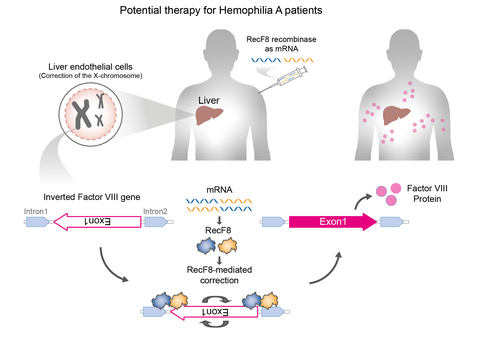Jan 21, 2022
Designer recombinase can precisely correct disease-relevant gene defect in severe form of hemophilia A

Schematic representation of the correction of gene inversion in the F8 gene with the de-signer recombinase RecF8. The sequences of the individual steps are represented by ar-rows.
The research team led by Prof. Frank Buchholz at the Carl Gustav Carus Medical Faculty of the Technical University of Dresden has succeeded in developing an enzyme that can efficiently and specifically correct a gene mutation in the Factor VIII gene, which is responsible for a severe form of hemophilia A.
People suffering from the severe form of hemophilia A are unable to produce a certain protein necessary for blood clotting. As a consequence, Hemophilia A patients often suffer from spontaneous bleeding, which can lead to chronic painful and degenerative joint disease, hematomas and also potentially life-threatening internal bleeding. Currently, patients are treated with a protein replacement therapy using recombinant factor VIII, which typically must be administered intravenously several times a week. Patients benefit from this treatment. However, so far this therapy can only alleviate the symptoms of the disease, but not cure the patients.
This fact might change in the future due to the designer-recombinase RecF8 generated by the RecTech team around Prof. Frank Buchholz. RecF8 is the newest innovation based on the designer-recombinase platform technology developed by the research group. Designer-recombinases represent a versatile and flexible genome editing tool that allows for precise and efficient genome modifications. The now presented RecF8 designer-recombinase can for the first time correct the defective factor VIII gene with high precision. About 50% of severe hemophilia A cases are caused by a so-called gene inversion - a gene segment that is practically turned the wrong way around. RecF8 is able to detect specific sequences in this inversion and rotate correctly the inverted DNA section back into the right direction. The team was able to show that the gene inversion causing hemophilia A could be reversed after treatment with RecF8 in patient cells, thus curing the cells. These results again demonstrate the high therapeutic potential of designer recombinases, as they could now also be used to correct disease-causing gene inversions.
"The next step is of course to prove the safety of RecF8 in animal models. Should the efficiency as well as specificity also be demonstrated in the animal model, a clinical trial with patients could follow. The results so far are promising and show the high potential of the technology for future clinical application," explains Prof. Buchholz.
References:
Correction of a Factor VIII genomic inversion with designer-recombinases.
Lansing F, Mukhametzyanova L, Rojo-Romanos T, Iwasawa K, Kimura M, Paszkowski-Rogacz M, Karpinski J, Grass T, Sonntag J, Schneider PM, Günes C, Hoersten J, Schmitt LT, Rodriguez-Muela N, Knöfler R, Takebe T & Buchholz F. Nature Communications volume 13, Article number: 422 (2022)
Pairing of single mutations yields obligate Cre-type site-specific recombinases.
Hoersten J, Ruiz-Gómez G, Lansing F, Rojo-Romanos T, Schmitt LT, Sonntag J, Pisabarro MT, Buchholz F. Nucleic Acids Res. 2021 Dec 24:gkab1240. doi: 10.1093/nar/gkab1240. Online ahead of print. PMID: 34951450
RecTech: RecTech is a project funded by the German Federal Ministry of Education and Research (BMBF) within the GO-Bio Innitiative. Within the planned spin-off RecTech, the research results mentioned here are to be further developed and commercialized.
Contacts:
Dr. Felix Lansing
Medizinische Fakultät Carl Gustav Carus der Technischen Universität Dresden
Fetscherstr. 74
01307 Dresden
Tel.: +49 (0) 351 463-40091
Fax: +49 (0) 351 463-40289
E-Mail: felix.lansing@tu-dresden.de
Prof. Dr. Frank Buchholz
Medizinische Fakultät Carl Gustav Carus der Technischen Universität Dresden
Fetscherstr. 74
01307 Dresden
Tel.: +49 (0) 351 463-40288
Fax: +49 (0) 351 463-40289
E-Mail: frank.buchholz@tu-dresden.de
